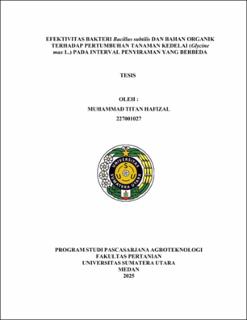| dc.description.abstract | MUHAMMAD TITAN HAFIZAL. Effectiveness of Bacillus subtilis Bacteria and
Organic Materials on Growth of Soybean Plants (Glycine max L.) at Different
Watering Intervals (Under the guidance of MARIANI BR SEMBIRING as Chair
of the Advisory Commission and NINI RAHMAWATI as Member of the Advisory
Commission).
Soybean cultivation in marginal lands is often constrained by drought stress. The
application of Bacillus subtilis, a microbe that produces the enzyme ACC
deaminase, along with organic materials such as manure and biochar, has the
potential to enhance plant tolerance. This study aimed to evaluate the effects of
Bacillus subtilis, organic materials, and watering intervals on the growth of
soybean variety Anjasmoro under drought conditions. The experiment was
conducted in a screen house at Komplek Citra Wisata, Medan Johor, using a
factorial Randomized Block Design (RBD) with three replications. The first factor
was microbial application (Bacillus subtilis and without microbes), the second was
organic material (no organic material, cow manure, and biochar), and the third
was watering interval (once every 1, 3, and 5 days). The results showed that Bacillus
subtilis improved plant morphology (plant height, number of leaves, number of
branches, leaf area, root length) and increased both fresh and dry weight.
Biochemically, Bacillus subtilis enhanced the activity of SOD and POD enzymes
but reduced yield components (number of seeds, seed weight, and number of pods).
Cow manure improved plant morphology and yield, while biochar was more
effective in enhancing enzyme activity. Daily watering supported optimal
morphological growth, whereas watering every five days increased chlorophyll A
and enzyme activity. There was a significant interaction between the three factors
on plant morphology, physiology, and biochemistry. The best combination for the
highest pod number was Bacillus subtilis, cow manure, and daily watering.
Meanwhile, the combination of Bacillus subtilis and biochar with five-day watering
was most effective in enhancing SOD enzyme activity.
Keywords: Bacillus subtilis, Organic materials, Soybeans, Watering interval | en_US |


